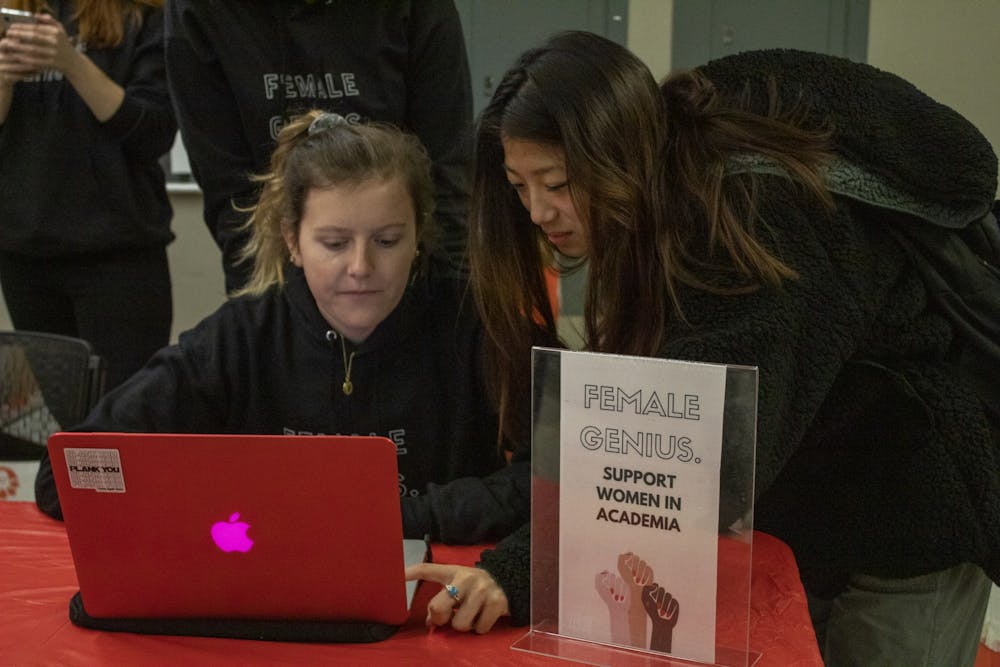Since its inception and arguably to this day, the Kelley School of Business has been an exclusively white, male space. It feels like the public only knows a fraction of what goes on in Kelley’s underbelly. Are controversies within the business school indicative of a larger issue, or are these situations not representative of the entire school?
As a Black student, multiple professors’ discriminatory comments tells me diversity is only important when it directly benefits those already in power. They are a detriment to administrators' efforts to recruit underrepresented groups. Their comments establish Kelley as inhospitable and unwelcoming to minority students.
These professors are not outliers in their school. They pose a problem with Kelley that needs to be addressed to create more empathetic graduates from the school.
Indiana University made national news a year ago when one of its professors, Eric Rasmusen, tweeted an article detailing why women are not suited for academia. Other professors within the business school have made similarly insensitive comments.
“Here’s how to make money on racism in the U.S.: buy property next to a black person,” Professor Charles Trzcinka tweeted in June during the historic Black Lives Matter protests. “In Bloomington, I bought next to a black family, she’s a doctor, he was an IU football coach. The market discount was about 10-15%. As society becomes less racist your property values rise.”
Trzcinka also tweeted about Bloomington BLM members spray painting the mural in People’s Park. He said the vandalism was arrogant and intolerant, in the now deleted Tweet. Trzcinka had the audacity to claim the Black Lives Matter movement is arrogant. It’s preposterous someone can genuinely think this about a movement centered around justice for an over-policed population.
“It felt like a gut punch,” Jordan Davis, who was the vice president of outreach for the Kelley student government, told the Indiana Daily Student in June.
Davis wasn’t surprised, though, she said. I am not a Kelley student, but as a Black woman, my heart would break if I heard an instructor in my school express those views.
Other professors have made comments voicing their critiques on affirmative action and the existence of the talent pool of underrepresented minorities. Despite the business school making great strides in recruiting minority students — something the administration should take great pride in — their administration's efforts are somewhat sullied by some professors' public disapproval of affirmative action.
“Google’s business is serving its constituency, its target markets,” Benjamin Schultz, a senior lecturer at Kelley, said in a February letter to the editor. “If they were forced to hire based on ethnic and cultural criteria, then their employment base would have a desirable diversity, but would they still be able to deliver the same level of shareholder value to their stockholders?”
While not overtly racist, Schultz’s letter highlights the issues with the culture at Kelley. It is worrisome that our future business professionals are being taught to think about diversity in such a callous, self-serving way.
Rasmusen's thinly veiled misogynistic comments were justified with faux intellectualism, claiming women are not predisposed to being geniuses like men are. However, the outrage in response to Rasmusen’s egregious sexist remarks did not match the outrage about his racist remarks he made shortly after the controversy sparked.
“The whole idea of affirmative action is that too few black students (would) get in without racial preferences, so we need to lower the standard for them and accept that they will do worse academically,” Rasmusen said in 2019.
Perhaps it was easy to advocate for women, particularly white women, because the marginalized group in this case is a majority. This reaction could be due to timeliness, but it is important to consider how students and faculty handled previous situations of professors saying questionable things
Idie Kesner, dean of the Kelley School of Business, wrote a heartfelt blog post urging people not to judge the school based on the actions of one faculty member. I agree with the assertion that not all Kelley professors hold these same views. However, it is also important to note it is not just one faculty member. It is not enough to simply avoid racism in our present circumstances. You have to be anti-racist.
I want the business school to be better, and it seems like they are making powerful strides in the right direction. After Rasmusen’s comment, the Women in Business club initiated a campaign to combat his views. They began selling “Female Genius” sweatshirts so people can show support for women in business.
I am proud the business school is taking a strong stance against misogyny. It sets a precedent for future empathetic classes of business students, and I hope this momentum is kept through the following years.
In the future, I hope to see the school and its students advocate for more difficult issues. Despite lingering systemic sexism in our country, Rasmusen’s overtly misogynist comments are not often seen anymore. It is easy to denounce them.
It is harder, however, to denounce his comments about affirmative action, something that has been debated for years. His comments — while using a political buzzword — were racist, and it is the job of the majority to protect underrepresented minorities he targeted with his comments.
Advocacy is not always easy. It takes personal effort, as well as dismantling personal biases and structural barriers. It is easy to advocate for a cause you have a personal investment in, but it is important to protest injustices that do not benefit you.
Don’t ask what racism can do for you, as Trzcinka did, ask what you can do to stop it.
Daelynn Moore (she/her) is a senior studying animal behavior and minoring in psychology, environmental science and biology. Don't be fooled by her major, her post undergraduate goals are to become a therapist.






